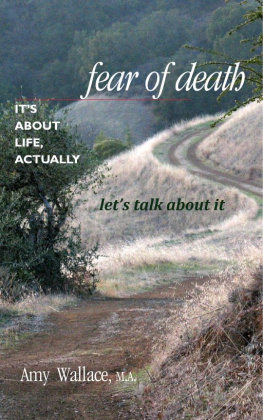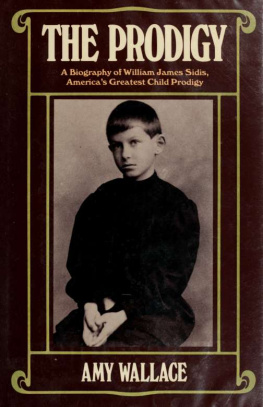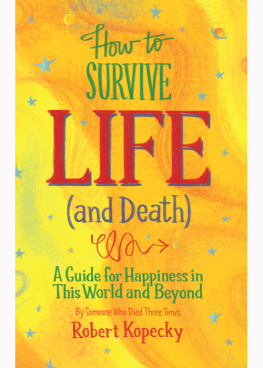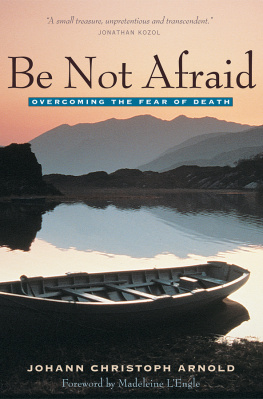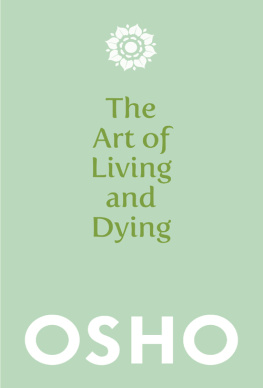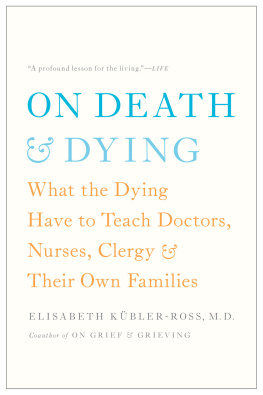Fear of Death
Its About Life,Actually
____________________________________
Lets Talk About It
by Amy Wallace, M.A.
Copyright 2013 Amy Wallace,M.A.
Smashwords Edition
This book is also available in paperback:
www.aboutlifeactually.com
Cover Design: Fishman Design
Truro, Massachusetts
www.fishmandesign.com
Photo by the author
to
My Parents
with
Love andGratitude
Table of Contents
Table ofContents
*****
*****
For what is it to die but to stand naked in the wind and to meltinto the sun?
And what is it to cease breathing, but tofree the breath from its restless tides, that it may rise andexpand and seek God unencumbered?
Only when you drink from the river ofsilence shall you indeed sing.
And when you have reached the mountain top,then you shall begin to climb.
And when the earth shall claim your limbs,then shall you truly dance.
From On Death inTheProphetby Kahlil Gibran
Preface
This inquiry or conversationis an opportunity for all of us to look deeply at our attitudes,fears, blind-spots, possibilities, and hopes about death. It couldchange for the better how we live our lives and our deaths.
There is a natural kind of progression tothis book, so I think it will be useful (although certainly notrequired) to go through the book in order. We start where many ofus are about death in Fear and Denial; the first chapter looks atwhat keeps so many of us from looking into or engaging with death(until we are forced to), as well as the costs to our alivenessresulting from not inquiring into the fact and reality of ourmortality.
The second chapter asks what might bepossible when we do take a look at death how it might affect thelives we lead, as well as the deaths we experience. There arequestions we can ask ourselves in order to deepen the inquiry...sometimes just asking them is a way of giving ourselves more powerin our relationship to death.
The third chapter offers 5 practices useful for living more consciously and happily on a daily basis, tobe sure but also helpful when we imagine facing death, as well aswhen the time comes for us to actually die.
I recommend taking the timeand space to experience the chapter Imagining Death anAncient Practice , and write down everything thatcomes up its all good information, from the most reliable sourceabout you you !There will be ideas, tools, and practices for working with all ofit in the subsequent chapters, so letting all the materialsurface will help produce the most value. The final chapters areintended to leave us feeling more at home with the idea of dying,and more empowered to live fully.
Appendix A is a list of books and otherresources that I have encountered and appreciated in my owninquiries about death and life. Many of the authors listed are wellknown and esteemed for their work in the field of death and dying;the list can be a useful wealth of resources for your owninquiry.
Appendix B contains some additional quotesand writings for further contemplation.
The new century has already given us manychanges and challenges; we have much opportunity and probablynecessity to open ourselves to one another and share the journey.Lets talk... about death, life, what scares or inspires us,where we need help and what help we can offer.
Were all just walking each otherhome.
Ram Dass
Amy Wallace, M.A. Counseling Psychology
Santa Cruz Mountains, California, USA
April 2013
Introduction
It all boils down to the fear ofdeath, arguably the cause of most of our unhappiness. Weunknowingly harm our loved ones out of fear; we hold ourselves backpersonally and professionally for the same reason. Since every fearhas its roots in the fear of death, learning to relax about thefear surrounding death will allow us to face everything else withgreater ease.
Elisabeth Kbler-Ross andDavid Kessler, Life Lessons
Lets talk about death. Not exactly agreat conversation starter. You can usually get people to agreethat we dont talk about it, but thats as far as it goes. I wasonce in a room full of therapists new friends, all great people and I started to talk about this book I wanted to write aboutfacing death. Yes, everyone agreed, we dont talk about death inour culture. So I asked a couple of questions about why theythought we didnt, and what if we did, and someone cleverly saidcould we change the subject, please? It took me a few seconds torealize they werent joking! They really didnt want to talk aboutit. And these were therapists some of the very people you expectto be able to help you when youre ready to deal with death.
I wrote this book for all ofus... given that every one of us will die, Ive noticed that anyconversation about death is conspicuously missing from our lives. I believe we need to talk aboutdeath, look deeply within ourselves about it, examine our beliefsabout it and come to a place of acceptance true acceptance, notjust resignation.
Most of us know of someone whose finalmoments, days, or longer, were spent in agony which could, perhaps,have been avoided if the person and their loved ones had talkedabout death in advance. Well-meaning medical professionalssometimes cause a dying person more pain trying to keep them aliveat all costs again, because the persons wishes werent madeknown in advance, or because their family wasnt ready to let themgo.
Things are changing... Hospice is nowwidely available to those with a terminal diagnosis who would liketo spend their last moments at home, with their family and friendsand with others who are trained to help them die with dignity andsome measure of peace. People can make their wishes known about howthey would and would not like to spend their last moments in thislife... provided they have been willing to face the reality thatthey will die and to make and communicate these choices inadvance.
Death should not be dealt with only once weare in the hospital or on our deathbed... it is a part of lifeand a most important one. Each of us deserves to have absolutelythe best possible death experience we can have the commitment towhich clearly also enhances our experience of living, increases ourawareness of the impact of our actions, and helps motivate us tocreate true meaning in our lives.
Lets talk about it! Letshave conversations about the reality of our mortality, our fearsabout death and life; learn about others experiences around death, and aboutwhat we can do for ourselves and people we care about.
As Ram Dass says in the videotaped workshopDying Into Love...
Dying is the most important ceremony in life.
The fact that each of us will die is one ofthe very few things we can count on in this life. Perhaps we canallow that fact to empower us to live more consciously, with morealiveness, satisfaction, gratitude, meaning, and purpose... andto die more consciously with more aliveness, satisfaction, andgratitude as we graduate from this school of life into whatevercomes next.
~~~~~~
Why Dont We Talk About Death?
One of the chief reasons we have somuch anguish and difficulty facing death is that we ignore thetruth of impermanence. We so desperately want everything tocontinue as it is that we have to believe that things will alwaysstay the same. But this is only make-believe.
Sogyal Rinpoche, The Tibetan Book of Living and Dying
Here are some of the answers I hear when Iask people why they dont talk about death:
Denial: I dont want to think about it;Ill think about it later; theres plenty of time for that; otherpeople dont want to talk about it; its morbid, impolite,depressing, inappropriate.

